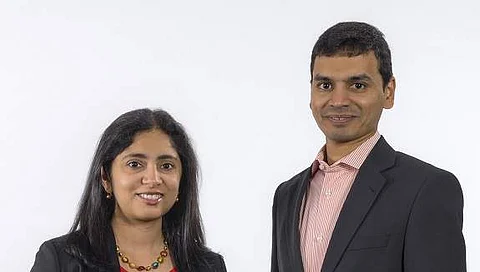

It's not unusual for a couple to be competitors in the same field or for a couple to even share an office. But for a husband and wife to win an internationally acclaimed award one after the other in two consecutive years - that's definitely unusual. Sharath Sriram and Madhu Bhaskaran have both won the Eureka Award, Australia's top Oscar-style Science Awards in the years 2016 and 2017 respectively, the fact that they won in consecutive years is unusual but it is also believed that Madhu could be the first woman of Indian origin to win the award.
The Australian Eureka Awards are science prizes awarded in the fields of scientific research & innovation, science leadership, science communication & journalism and school science, this year Madhu was awarded in the 'Outstanding Early Career Researcher' category. Madhu works in the field of wearable electronics such as your fit bit and smartwatches, she won the award for use of stretchable oxides to develop unbreakable and transparent devices that could be worn like “electronic skin”, which could help in the fight against skin cancer, detect dangerous gases in mines, and eventually become an integral part of daily life and healthcare.
She speaks with Edexlive about winning the award and her plans for the future.
Can you please tell us a little about yourself- growing up in Chennai, moving to Australia and your work there?
I was born in Chennai and did my schooling there. I then did my Bachelor of Engineering at PSG College of Technology in Coimbatore. After completing this, I decided to pursue a Master of Engineering in Microelectronics at RMIT University in Melbourne, Australia. I came here in 2004. Following my Masters, I was offered an international scholarship to do a PhD which I did from 2006-2009. I have since then stayed on as a postdoctoral fellow, senior lecturer, and now associate professor at RMIT University. My work is in wearable electronics - it involves the research in actually making these devices. Specifically, I focus on wearable sensors in the form of gas sensors and UV sensors. The award is given to recognise contributions to research in my case - so, specifically for my research in the last 5 years on the stretchable electronics.
Since your husband also received the award last year, can you tell us if you two are colleagues and how did you meet?
I met my husband Sharath at PSG College of Technology. Both of us have had a similar career following that in terms of doing a Masters, PhD, and now being an academic.
When did you hear about the award and what was your immediate reaction? How did your husband react?
I got to know I was one of the finalists in July. The award is similar to the Oscars as all finalists of the 15 categories are invited to the ceremony in Sydney and the winner for each category is announced on stage. So, I did not know I was going to win until I was announced the winner! It is an amazing honour and I am certainly pleased and also very happy that the work has been recognised. I am very thankful to my hard working research group and also to my family for motivating and supporting us.
Is this the first time that a husband and wife have won the award and is it also the first time that an Indian woman has won the award?
I am not quite sure of that but it is highly likely. There are 15 categories though and while we have both won an Eureka Prize, it is in two different categories and recognises different research results and capabilities. Sharath won it in the Emerging Leader in Science category ( for work in development of a memory cell which will bring researchers closer to imitating key electronic aspects of the human brain – a vital step towards creating a bionic brain – which could help unlock successful treatments for common neurological conditions such as Alzheimer’s and Parkinson’s diseases). While I won the Outstanding Early Career Researcher category.
Has the award opened up new avenues? What are your future plans with regard to your research?
We are working with a few industry partners to try and take the wearable sensors to the next stage towards prototyping and commercialisation. The research has also led to us making inroads in a few other fields such as optics as it can be used to make the next generation flat lenses and potentially smart contact lenses.
Any plans to return to India in the near future?
Coming back to India is not on the cards now - both of us are settled here in permanent jobs
